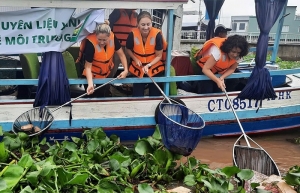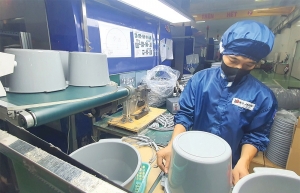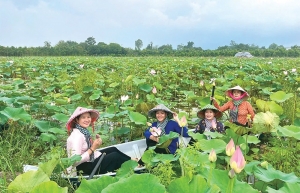The tourism industry tackles plastic waste
Minimising plastic waste was the central theme at a conference on the circular economy in tourism in early December in Hoi An. Vu Thi My Hanh, director of two projects providing waste circular solutions, explained that tourism in the area has generated millions of single-use plastic products annually, and its waste management capacity has long been overwhelmed.
“Companies like ours, which provide solutions for reducing and recycling waste, have been working to manage millions of tonnes of waste in Hoi An for years. We believe that for greener development, high-circular solutions such as reuse and refill are a pressing need,” she said.
Hanh oversees two active schemes in environmental sustainability. The Green Youth Collective focuses on circular methods to transform organic waste into inputs for eco-gardens that are resilient to climate change. Each day, the initiative helps redirect up to 500kg of organic waste in Hoi An.
 |
| The tourism industry tackles plastic waste, Photo: ShutterStock |
Meanwhile, the Refillables Dong Day scheme is a retail model offering consumer-friendly products that reduce harmful chemicals in the environment through a refill and reuse packaging system. After six years operating in Hanoi and Hoi An, the initiative now offers 300 products and has achieved over 110,000 refills with reusable packaging. In Hoi An alone, more than 40 businesses have joined.
Vietnam attracted over 17 million international visitors and 110 million domestic visitors in 2024, according to the Vietnam National Administration of Tourism. However, the rapid growth of the sector poses significant environmental challenges.
Deputy director of the Vietnam National Authority of Tourism, Ha Van Sieu said, “Vietnam’s tourism industry is on the rise, with an increasing number of visitors. However, this also means that activities will contribute to a rise in plastic waste.”
On average, each tourist discards 5-10 plastic bags and 2-4 plastic bottles or milk cartons per day. The Institute for Tourism Development Research also predicts that the total amount of plastic waste generated by visitors could reach nearly 340,000 tonnes by 2030, compared to 116,000 tonnes in 2019.
“If no measures are taken, plastic waste in this industry alone is expected to triple in the next five years, putting immense pressure on the environment,” said institute director Nguyen Anh Tuan.
To encourage and support destinations and businesses in reducing plastic waste, the Vietnam Tourism Association aims to eliminate non-biodegradable plastic bags and single-use plastic products at all tourist hotspots, accommodation establishments, and hotels in 2025. It has developed an action plan which includes tasks such as raising awareness, creating green tourism products, and developing initiatives that focus on plastic waste reduction.
Tran Thai Do, the CEO of Silk Sense Hoi An River Resort in Quang Nam, said the resort was one of the earliest establishments in the province to practice plastic-free hotels and has a wealth of practical experience in sustainable practices. The resort has established a waste separation system for organic, plastic, paper, and metal waste, while also recording and comparing the amount of waste by type and day to ensure that plastic waste decreases gradually.
“We have also signed a contract with Quang Nam Urban Environment JSC to regularly collect and efficiently handle plastic waste. For nearly a year now, the resort has stopped disposing plastic waste into the environment,” Do said.
By eliminating or reducing the use of plastic, Silk Sense Hoi An River Resort has cut more than 80,000 single-use plastic bottles and over 10 tonnes of plastic waste from the environment since 2023.
Meanwhile, since 2022, Sofitel Legend Metropole Hanoi has used environmentally friendly bathroom amenities from French fashion house Balmain Paris. New shower installations in guest rooms feature tamper-proof 400ml bottles of premium shampoo, conditioner, and body wash made from fully recycled materials.
Popular destinations around the world have to deal with a significant amount of plastic waste, accounting for over 30 per cent of the total solid waste in many coastal areas, according to the World Bank. To reduce plastic waste at such destinations, many hotel brands have made commitments to minimise or eliminate single-use plastics from their operations.
For example, in 2024, South Korea implemented new environmental regulations requiring hotels accommodation facilities with more than 50 rooms not to provide complimentary single-use personal hygiene items to guests. Those breaking the rules face fines of over $2,000.
 | Vietnam urged to accelerate fight against plastic waste Vietnam is being cautioned about the increasing levels of plastic waste entering its water environments, undermining both environmental quality and the country’s sustainable development efforts. |
 | Reviving a new life cycle for plastic waste Discarded plastic items will have the opportunity to be reborn as new products, re-entering the consumer market with different missions and values. |
 | Dong Thap inspires with its green tourism development Dong Thap province in the Mekong Delta is adopting innovative approaches to green tourism, aligning with global trends and unlocking significant opportunities for its tourism industry. |
What the stars mean:
★ Poor ★ ★ Promising ★★★ Good ★★★★ Very good ★★★★★ Exceptional
Related Contents
Latest News
More News
- Vietnam ranks second among Chinese travellers’ top destinations (January 14, 2026 | 11:59)
- Visa data highlights five key payment and travel trends in Vietnam for 2026 (January 14, 2026 | 10:42)
- New Year tourism receipts top $40m in key cities (January 06, 2026 | 08:36)
- Vietnamese passport climbs on global ranking (December 16, 2025 | 08:00)
- Manila becomes a new check-in destination for Vietnamese youth (December 11, 2025 | 18:07)
- Vietjet launches mega year-end ticket promotion (December 10, 2025 | 11:33)
- Dalat leads Vietnam’s 2025 search trends (December 09, 2025 | 13:44)
- Vietnam welcomes record wave of international visitors (December 09, 2025 | 13:43)
- Vietjet launches daily Manila flights to celebrate year-end festive peak season (December 05, 2025 | 13:47)
- The destinations powering Vietnam’s festive season travel demand (December 04, 2025 | 18:33)

 Tag:
Tag:

















 Mobile Version
Mobile Version